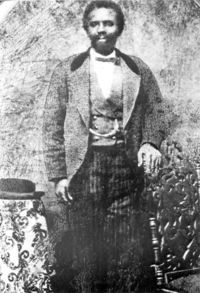Difference between revisions of "Zebulon Elijah"
m |
m (error) |
||
| Line 6: | Line 6: | ||
| date_of_birth =[[1836]] | | date_of_birth =[[1836]] | ||
| place_of_birth =Milton, Florida | | place_of_birth =Milton, Florida | ||
| − | | date_of_death =[[December | + | | date_of_death =[[December 3]], [[1910]] |
| place_of_death = | | place_of_death = | ||
| occupation =Slave, politician, civil servant | | occupation =Slave, politician, civil servant | ||
Latest revision as of 14:51, 8 February 2009
| Zebulon Elijah | |
|---|---|
| Born | 1836 Milton, Florida |
| Died | December 3, 1910 |
| Occupation | Slave, politician, civil servant |
| Spouse | Lucy Ann Caldwell |
| Children | Ten children |
Zebulon Elijah (1836-1910) was a slave born on a Milton farm and owned by Emma Bright, who loaned him to various Pensacola businesses, including the Gonzalez brickyard and later Dr. Robert Bell Hargis. He was hired by a French ship's captain, and on his voyages he learned to read, write and speak fluent French. He married Lucy Ann Caldwell in 1862.
When he was freed after the Civil War, Zebulon chose Elijah as his surname after the Biblical figure who was fed by ravens. In 1866 he opened a grocery in Pensacola.
Elijah became active in area civics and politics. He was listed as a customs inspector in the 1870 census. He served as an Elections Enumerator, represented Escambia County in the Florida House of Representatives from 1871 to 1873, and was appointed to the Escambia County Commission in 1872. He served as the Pensacola Postmaster from 1874 to 1878 and as Pensacola tax assessor from 1881 to 1882.
Zebulon had ten children with Lucy Ann. He died on December 3, 1910. A eulogy by Andrew F. Warren praised his life and career:
| For nearly twenty-five years 'Zeb,' as he has been known to almost all the older residents of Pensacola, has been in the service of the business with which I am connected. During all that time he has commended himself to all with whom he came in contact, as a gentleman. His rank has not been exalted, but his honesty, faithfulness and courtesy endeared him to us all.[1] |
